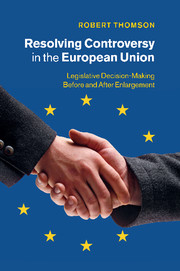 Resolving Controversy in the European Union
Resolving Controversy in the European Union Book contents
- Frontmatter
- Contents
- Figures
- Tables
- Acknowledgements
- 1 Introducing the political system of the European Union
- 2 Research design: measuring controversy spatially
- Part I Inputs
- Part II Processes
- 7 Transforming policy positions into decision outcomes
- 8 The relative power of the institutions
- 9 The relative power of the member states
- Part III Outputs
- 12 Evaluating and improving the European Union
- Appendix The selection of legislative proposals
- References
- Index
8 - The relative power of the institutions
from Part II - Processes
Published online by Cambridge University Press: 07 October 2011
- Frontmatter
- Contents
- Figures
- Tables
- Acknowledgements
- 1 Introducing the political system of the European Union
- 2 Research design: measuring controversy spatially
- Part I Inputs
- Part II Processes
- 7 Transforming policy positions into decision outcomes
- 8 The relative power of the institutions
- 9 The relative power of the member states
- Part III Outputs
- 12 Evaluating and improving the European Union
- Appendix The selection of legislative proposals
- References
- Index
Summary
Supranationalism versus intergovernmentalism
This chapter answers the question ‘who has power in the European Union (EU)?’ by assessing the power of the Commission, European Parliament (EP) and Council relative to each other. During the process that transforms policy demands into decision outcomes, actors attempt to influence each other so that their policy demands are incorporated into outcomes as much as possible. Actors may differ from each other in their potential to exert such influence; in other words, they may differ in power. Researchers and practitioners express a wide range of views on the distribution of power among the Commission, EP and Council. The impact of EU enlargement on the distribution of power among these three institutions is also uncertain.
A classic definition of power that gives an appropriate point of departure for this chapter is that it is the potential a person or group has ‘to realize their own will in a social action even against the resistance of others’ (Weber 2007/1914: 247). This simple definition holds a number of insights that are highlighted by later definitions and discussions of power. First, Weber’s definition implies that the focus of power is on influencing ‘social’ or collective actions. In the context of the legislative process, this implies that the focus of power is on influencing the contents of legislative acts. Influencing other actors may be an important means to the end of influencing the contents of legislative acts, but this is not always necessary. By contrast, Dahl’s often-cited definition of power focuses on interactions between actors, rather than outcomes: actor ‘A has power over [actor] B to the extent that he can get B to do something that B would not otherwise do’ (Dahl 1957: 203). Depending on the decision rule, it is not always necessary for actor A to convince B to change its behaviour for A to influence decision outcomes. For instance, under the co-decision procedure, the Council and EP could in principle change the legislative proposal and adopt an act that the Commission does not support. Therefore, it is not necessary for the Council and EP to change the Commission’s behaviour to influence the decision outcome.
- Type
- Chapter
- Information
- Resolving Controversy in the European UnionLegislative Decision-Making before and after Enlargement, pp. 188 - 211Publisher: Cambridge University PressPrint publication year: 2011


